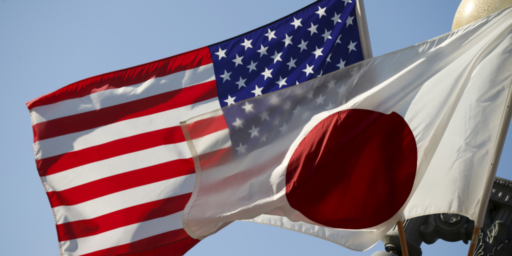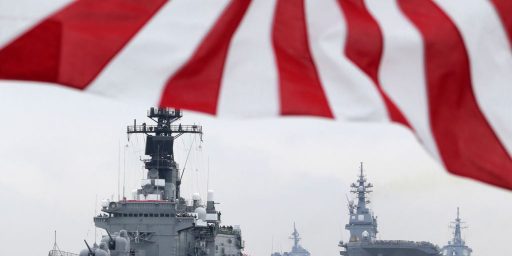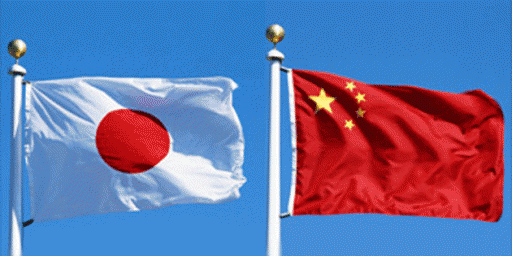Anti-Japanese Protests Continue In China
While China and Japan their rather open dispute about conflicting claims to a few islands in the East China Sea, China is witnessing its second day of supposedly spontaneous protests against the Japanese claims to the islands:
BEIJING — Anti-Japan demonstrators took to the streets again Sunday in cities across China, with the government offering mixed signals on whether it would continue to tolerate the sometimes violent outbursts.
The protests were orderly in Beijing, with several hundred people circling in front of the Japanese embassy demanding Chinese control over a small island group known in Japanese as Senkaku and in Chinese as Diaoyu. Protests were also reported in several other cities, including Shanghai, Guangzhou and Qingdao.
On Saturday, protests spread to over 50 cities, with some violence reported. In Qingdao, a factory for the Panasonic Corporation was set on fire and a Toyota dealership was looted, according to pictures on social media sights and local residents reached by telephone.
“Across China, calls have grown for boycotts of Japanese products. Many Japanese retailers and restaurants have been forced to place signs in their windows supporting China, and on Sunday, Japan’s prime minister called on China to protect Japanese people and property.
A signed editorial on the Web site of The People’s Daily, the authoritative Communist Party mouthpiece, said the protests should be viewed sympathetically. While not defending the violence, the editorial said the protests were a symbol of the patriotism of the Chinese people.
“No one would doubt the pulses of patriotic fervor when the motherland is bullied,” the editorial read. “No one would fail to understand the compatriots’ hatred and fights when the country is provoked; because a people that has no guts and courage is doomed to be bullied and a country that always hides low and bide its time will always come under attack.”
(…)
Both countries claim the disputed islands, although Japan has controlled them for over a century. Beijing ratcheted up pressure on Tokyo after the Japanese government purchased the islands from private owners. Japan says the move was to prevent nationalists from using the islands, but China has seen it as a step to firm up Japanese control. In response, China dispatched surveillance ships to the waters.
It does seem odd for Japan to have control over islands located hundreds from the home islands, but this island group is located near the Japanese controlled Ryukyu Islands, and has effectively been under the control of Japan since 1895. As for the protests, it’s hard to believe that they are truly spontaneous or outside the control of the party and, indeed, one analyst effectively says that the Chinese have a long history of using popular protest to advance their foreign policy agenda:
Evidence arose Sunday that some government officials were directly involved in the protests. In the western city of Xi’an, Chinese Internet activists identified one of the people as the city’s police chief. Although localized riots and protests are common in China, organized, planned protests that are tolerated by the authorities are rare. .
The political analyst Li Weidong said the tolerance fit a long-standing pattern of behavior in which Chinese governments use mass protests to further foreign policy goals. In a text message sent to friends and associates, Mr. Li compared the current protesters to the Boxers, a quasi-religious group that was used by the Qing dynasty to oppose foreign incursions.
“Beijing dares not to fight, but it’s unable to talk it over either,” Mr. Li wrote. “So it has to employ Boxers, using product boycott to press Japan.”
At the same time, though, it’s clear that the government would prefer to control the protests. Tuesday should be an interesting day, it is the 81st anniversary of the Mukden Incident, widely seen in China as the beginning of the invasion of China in 1931 by the Imperial Japanese.






For what it’s worth, my sister did business in China soon after their opening to the west. She was struck by the strong WWII memories shared with her. It’s surprising to me that China and Japan managed to be on as good terms as they have been.
The Ryukus were administered by the USA from 1945-1971, when it was decided to return them to Japanese rule. But that was not an entirely certain thing as I recall. There were calls to have the US permanently rule them as a territory.
As for the suspicions that the Chinese government is behind the demonstrations, I can tell you (I’m Chinese American, my parents lived in Japanese occupied China in WWII) that the memories of Japanese atrocities during the war is alive and well. The Chinese government is in a “damned if you do, and damned if you don’t” situation regarding Japan. It can either lead from the head or from behind (public sentiment) about this. It risks being criticized by the netizens for not protecting Chinese sovereignty or for not controlling the actions of the mobs. In a way this was a result of their own actions, as they’ve done their part in fanning the anti-Japanese sentiments when they thought it suited their political goals.
By that metric, the US has no right to Hawaii. After all, why should the US have control over islands located hundreds of miles from the continental US?
Some on Okinawa still remember the American rule fondly.
http://www.nytimes.com/2012/02/21/world/asia/in-okinawa-some-still-toast-era-of-us-control.html
Which is why Obama must resign.
And there’s still unresolved claims Russia and Japan have over another part of the island chain, a mutual defense treaty, and Japanese funded US military bases, things could get tricky.
Anybody with a brain should be sympathetic with China over the horrific Japanese actions in WWII. But other than the animosity between the countries, that doesn’t seem to have anything to do with the claims to those islands. And it appears that the Japanese have a much stronger case, from what I’ve read. That said, the stakes are unusually large for such a small amount of land area, considering the fishing and other rights that go with it. It would be in the interest of both parties that they work out a deal where the Chinese can permanently fish in the area.
As I recall (source unavailable at this time, so my memory may be faulty), this is really all about the natural resources — oil & gas mostly. Those islands are too small to be of any use for anything other than practice ranges for US & allied aircraft.